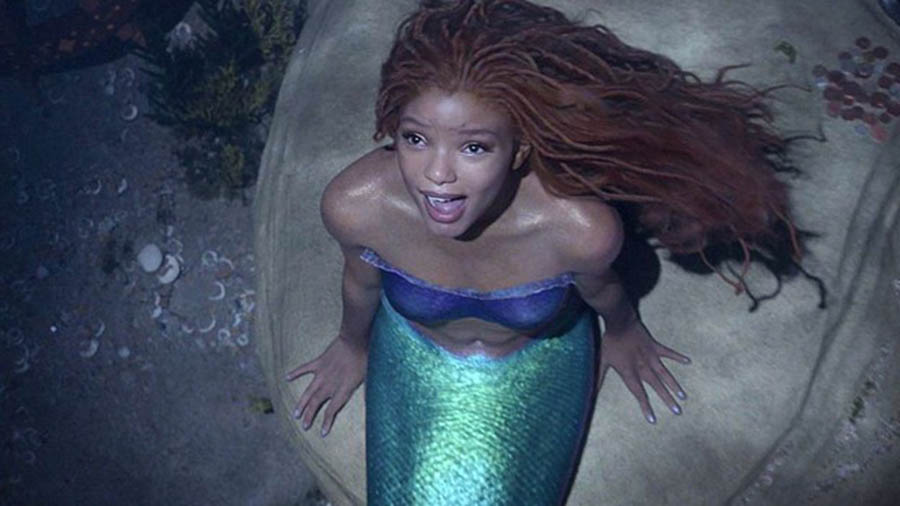(BBC) Being half-fish, half-human isn’t quite a superpower, but Disney’s live-action Little Mermaid reinvents the animated classic for the age of Marvel movies, complete with kinetic action scenes and an endless overload of CGI. Those sequences somehow have to coexist with Broadway-style belting of songs, elaborate choreography and revisions to adapt the film for contemporary sensibilities, so… whew!
This Little Mermaid is a lot. But at its heart, it is the same girl-fish-out-of-water story, which has the great advantages of Halle Bailey as a captivating Ariel, Daveed Diggs as the perfect comic voice of Sebastian the crab, and songs from the 1989 original that have remained audience favourites for decades. The new Little Mermaid is uneven, but it is also a spectacle with an allure and vitality of its own.
Bailey has a big, crystalline voice and bravura delivery yet gracefully captures the passion beneath the words when she sings Part of Your World, about her longing to be on land. She is also a fine actor whose wide-eyed sincerity makes us believe that Ariel is enamoured of all things human, from a fork to Prince Eric (Jonah Hauer-King), whom she rescues from a shipwreck – fires on board, swelling waves, sailors leaping into the sea. Even her costume is just right, beautifully designed with light-blue iridescent scales and gossamer fins.
Ariel’s father, King Triton (Javier Bardem), who believes all humans are vile, commands a rich undersea world, which director Rob Marshall has crammed with CGI turtles, dolphins, and all kinds of fish and coral life forms. That world is colourful and, yes, as dark as the trailer suggests. It is, after all, a place without sunlight.
Marshall’s musical films include Chicago and Into the Woods, but he started out on Broadway, and there is an awkward stop-and-go motion to The Little Mermaid that echoes the way musical theatre often pauses to let a song take centre stage. Part of Your World, with the camera focused on Ariel alone, seems to beg for audience applause, and actually got it at my screening, as if Bailey could hear through the movie screen.
Diggs is a pure delight as Triton’s advisor. Sebastian bows to the king with a wave of his claw and grumbles asides in his Caribbean accent. “College-educated crab,” he says of himself when Triton assigns him to watch over Ariel instead of advising on state affairs. “I got options.” Sebastian’s Under the Sea is another extravaganza, the joyful Calypso song set against rows of animated sea creatures whose choreography is based on a collaboration with the Alvin Ailey Dance Foundation.
There is logic to the breakdown of live action and animation here. Even half-humans are played by actors while everyone else is animated, including Ariel’s friends Scuttle the bird (voiced by Awkwafina, given too few funny lines) and Flounder (Jacob Tremblay in a functional role). But if only we could have seen Diggs singing and dancing.
Melissa McCarthy plays the sea-witch Ursula with evil glee, but is constantly overwhelmed by bolts of light, her own flailing tentacles and other special effects, especially when offering Ariel her deal: grow legs, go above the sea and make Eric fall in love with her, but do it without a voice. Even without dialogue, Bailey makes her connection with Eric seem real, and Hauer-King gives Eric enough of a character, a prince with a social conscience, so that he’s more than the usual bland Disney dreamboat.
The original songs by Alan Menken, with lyrics by the late Howard Ashman, are mostly intact, and the small changes are barely noticeable improvements. Kiss the Girl now says “Just ask her” instead of suggesting that Eric just go in for the kiss, and Ursula’s Poor Unfortunate Souls no longer suggests that men prefer women who can’t speak (even though the film is set in the 19th Century). The three new songs by Menken with lyrics by Lin Manuel-Miranda don’t begin to measure up, though. A rap called The Scuttlebutt, which Awkwafina and Sebastian sing, is not great but at least it avoids the blandness of Eric’s Wild Uncharted Waters and Ariel’s For the First Time.
In true superhero fashion, the film feels padded. A dance scene on a beach and a carriage ride for Eric and Ariel stretch the running time to two hours and 15 minutes.
In another unnecessary touch, Eric’s mother the Queen (Noma Dumezweni) delivers a final, blunt message of unity, saying that the worlds of sea and land should live in harmony. The film’s diverse casting has already made the point about unity, and done so much more eloquently. The Little Mermaid mostly avoids preaching, though. It remains what it always was: a charming, escapist fairy tale.






